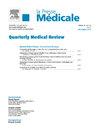Treatment of elderly and frail myeloma patients
IF 3.4
3区 医学
Q1 MEDICINE, GENERAL & INTERNAL
引用次数: 0
Abstract
Multiple myeloma (MM) is an incurable cancer of older adults. Given the aging population, the prevalence of older adults with MM is expected to further increase over the next decade. Challenges in treating older adults result from the heterogeneity of both aging itself and the disease. Over the past two decades, tremendous progress has been made in improving the outcome in this age group with novel therapeutics, including immunomodulatory drugs, proteasome inhibitors, and more recently anti-CD38 monoclonal antibodies, becoming an integral part of initial treatment. Further improvements are expected over the next decade with novel immunotherapy, including T-cell engagers and chimeric antigen receptor therapies. With additional novel treatments, assessment of patient frailty will become increasingly important in balancing the optimal treatment of patients. In this review, we focus on the treatment of elderly and frail older adults with MM. The first part of our review will focus on pertinent investigations, considerations for treatment initiation and initial risk stratification, including frailty assessment prior to treatment initiation. In the second part, we will focus on the overall goals of treatment and therapeutic options for newly diagnosed and those with relapsed/refractory MM, including novel immunotherapy and supportive care. Lastly, we will end this review by highlighting current knowledge gaps and providing suggestions for future directions to further improve outcomes among older adults with MM.
治疗年老体弱的骨髓瘤患者。
多发性骨髓瘤(MM)是一种无法治愈的老年人癌症。随着人口老龄化的加剧,预计在未来十年中,老年多发性骨髓瘤患者的发病率将进一步上升。老龄化本身和疾病的异质性给老年人的治疗带来了挑战。在过去的二十年里,随着新型治疗药物(包括免疫调节药物、蛋白酶体抑制剂以及最近的抗 CD38 单克隆抗体)成为初始治疗不可或缺的一部分,在改善这一年龄组患者的治疗效果方面取得了巨大进步。预计在未来十年,新型免疫疗法(包括 T 细胞激活剂和嵌合抗原受体疗法)将进一步改善治疗效果。随着更多新型疗法的出现,评估患者的虚弱程度对于平衡患者的最佳治疗将变得越来越重要。在本综述中,我们将重点讨论老年和体弱老年 MM 患者的治疗问题。综述的第一部分将侧重于相关检查、开始治疗的注意事项和初始风险分层,包括开始治疗前的体弱评估。在第二部分,我们将重点讨论新诊断和复发/难治性 MM 患者的总体治疗目标和治疗方案,包括新型免疫疗法和支持性护理。最后,我们将在本综述的最后强调目前的知识空白,并就未来的发展方向提出建议,以进一步改善老年 MM 患者的预后。
本文章由计算机程序翻译,如有差异,请以英文原文为准。
求助全文
约1分钟内获得全文
求助全文
来源期刊

Presse Medicale
医学-医学:内科
自引率
3.70%
发文量
40
审稿时长
43 days
期刊介绍:
Seule revue médicale "généraliste" de haut niveau, La Presse Médicale est l''équivalent francophone des grandes revues anglosaxonnes de publication et de formation continue.
A raison d''un numéro par mois, La Presse Médicale vous offre une double approche éditoriale :
- des publications originales (articles originaux, revues systématiques, cas cliniques) soumises à double expertise, portant sur les avancées médicales les plus récentes ;
- une partie orientée vers la FMC, vous propose une mise à jour permanente et de haut niveau de vos connaissances, sous forme de dossiers thématiques et de mises au point dans les principales spécialités médicales, pour vous aider à optimiser votre formation.
 求助内容:
求助内容: 应助结果提醒方式:
应助结果提醒方式:


